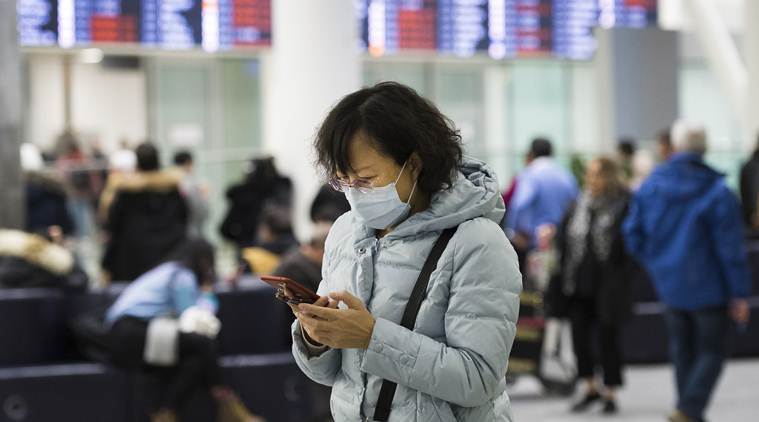Some of the world’s biggest companies have limited travel and closed stores and offices because of the new disease.
The coronavirus is starting to impact the technology industry’s global business. Apple and Google, among others, have begun closing stores and offices, limiting business travel to China and bracing for supply chain disruption as health officials around the world seek to contain the disease. The GSMA, the group that organizes Mobile World Congress, said it would have additional medical personnel on-site when the conference opens in Barcelona on Feb. 24.
On Friday, the US government issued a federal quarantine for 195 Americans evacuated from the epicenter of the virus, marking the first such quarantine in half a century. The World Health Organization on Thursday declared the 2019-nCoV strain of the virus a public health emergency of international concern, citing worries about its spread, particularly to countries “with weaker health systems.” The death toll has risen to at least 350 and the number of infections has passed 17,000.
The virus was discovered in the Wuhan region of China late last year, and causes symptoms that are similar to pneumonia. It was first reported to the WHO on Dec. 31, with Chinese scientists linking the disease to a family of viruses that includes SARS and MERS (Middle East respiratory syndrome).
The virus has infected over 17,000 people in China, according to the WHO, and infections have been found in more than a 20 countries. Nine cases have been identified in the US, where the disease has spread person to person. It’s also been found in Australia, Europe, the Middle East and other parts of Asia.
Airlines have begun curtailing flights to China. United Airlines has suspended operations between its hubs and Beijing, Chengdu and Shanghai beginning Feb. 6 through March 28. The airline says it will operate “select flights” to ensure US-based employees and customers can return home, It will also fly one daily flight between San Francisco and Hong Kong. Other airlines either canceling China flights or extending travel waivers include American, Air Canada, British Airways, Cathay Pacific, Delta, Lufthansa, Austrian, Swiss and Finnair.
The Allied Pilots Association filed a lawsuit seeking a temporary restraining order to suspend American’s US-China flights citing the “serious, and in many ways still unknown, health threats posed by the coronavirus.” American Airlines acknowledged the lawsuit and said it’s in touch with health authorities to “make sure we are taking all necessary precautions for our customers and team members.” A US flight attendants union is also urging flights to China be canceled until the outbreak is contained.
Many tech companies are monitoring the situation closely and have curtailed nonessential travel. Lenovo, the Chinese laptop maker, said it was avoiding large face-to-face meetings and allowing more people to work from home until more is known about the outbreak. HP has implemented some travel restrictions for employees going to and from China. Mozilla, which makes the Firefox browser, is making masks and hand sanitizer available. Facebook and Twitter are suspending nonessential travel to China, while Nintendo reportedly said production of its popular Switch handset in China was “seeing some impact from the coronavirus.” Five factories that make LCD and OLED panels are expected to see slowdowns in production, according to IHS Markit, a research firm.
Those companies aren’t alone. Here’s how the virus is impacting and affecting on some of the biggest names in tech.
Apple
The iPhone maker has temporarily shuttered all of its stores in mainland China, one of its biggest and most important markets. Apple is also closing its corporate offices and contact centers in China through Feb. 9.
“Our thoughts are with the people most immediately affected by the Coronavirus and with those working around the clock to study and contain it,” Apple said in a statement Saturday, according to CNBC. “Out of an abundance of caution and based on the latest advice from leading health experts, we’re closing all our corporate offices, stores and contact centers in mainland China through February 9.”
During its earnings call on Jan. 28, CEO Tim Cook said “a number” of Apple’s retail partners have closed their locations as well.
Apple has suppliers in the Wuhan area but also has alternative sources for the components they provide. The company is “working on mitigation plans to make up any expected production loss,” Cook said. What’s less clear is how the coronavirus will impact suppliers in other parts of China, he said.
The Chinese government extended the Lunar New Year holiday break from the end of January to Feb. 10, which will delay the startup of Apple supplier factories, Cook said.













![Hotstar Premium Cookies 2019 [*100% Working & Daily Updated*] Hotstar Premium Cookies 2019 [*100% Working & Daily Updated*]](https://tahav.com/wp-content/uploads/2019/11/Hotstar-Premium-Cookies-Free-100x70.jpg)



